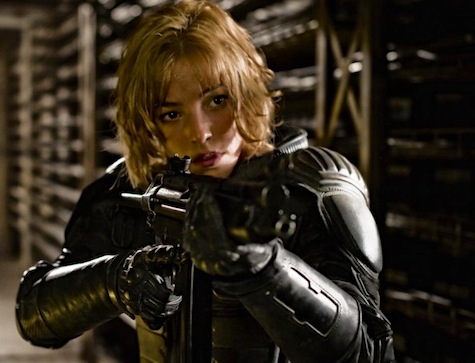Not so long ago, I watched 2012’s Dredd, a stylish, brutal, and many-layered adaptation from the Judge Dredd comics, for about the seventh time. (See also Tim Maughan’s review, “A Comic Book Movie That Explodes Across The Screen.”) Watching it afresh, it struck me anew how well-made it is: its thematic arguments are actually arguments, and ones put forward with a degree of nuance. The figure of Dredd, a man who has given over his conscience to the brutal and unforgiving edifice of Law, has a parallel in the character of Ma-Ma (Lena Headey, in an excellent performance), a crime boss whose conscience, if she ever had one, was long since given over to acquiring and maintaining Power.
They both represent order, of a kind, but their orders are fundamentally opposed. The tragedy of Dredd’s dystopia is that neither of them are capable of making different choices: their entire world mitigates against it. For them, in the words of one of the film’s minor characters, Mega City One is nothing but a meat grinder: “People go in one end. Meat comes out the other. All we do is turn the handle.”
The figure of Anderson, a rookie Judge (played by Olivia Thirlby), lies in the space between, and her character is the pivot on which rests the film’s emotional weight. Neither Dredd nor Ma-Ma can change, or choose. But Anderson? The film hinges on her choice, between Dredd’s absolutism (“Negotiation’s over,” he says at one point, and at another, “Judgment time”) and the radical possibilities of mercy. (“Maybe it’ll be the one difference I do make,” Anderson says, sparing a man Dredd would—most likely—have killed.) It’s her character, and her choices, that open Dredd up to hope. That subverts, in essence, the film’s grim dystopian violence by its argument that even in the meat grinder of Mega City One, it’s still possible to make a difference to individuals.*
*Yes, I have Thoughts about Dredd. For me, it’s a film that rewards rewatching and discussion.
There are four characters with substantial amounts of screentime and dialogue in Dredd. Two of them are women. And neither of these characters is defined by her femaleness in relation to her narrative arc or to the characters around her. Dredd’s women are fully human. The camera inhabits their subjectivity—does so, in fact, in a way that it never even approaches with its eponymous Judge, whose face and therefore emotions we never fully see.
Dredd’s world is a dystopia. Crapsack World. But the way the film constructs its female characters is a radical vista of feminist possibility in comparison to how two recent films whose source material is explicitly utopian construct theirs.
In the rebooted Star Trek, the subjectivity—the interiority—of the female characters with dialogue (shall we say all, counting Uhura’s Orion roommate in Star Trek 2009, three of them?) is given hardly a passing respect. We see them through an objectifying lens: Uhura’s underwear scene in the 2009 film; Dr. Carol Marcus’s in Into Darkness. (Plus Kirk’s ménage á trois, when ID doesn’t even feature two women speaking to each other—or one woman speaking at another—once.)
Despite my great regard for Uhura’s increased role (and for her Klingon moment of awesome in ID) in the new films, it must be said that a large amount of that role is defined by her relationship with Spock. But where Uhura’s emotional beats revolve around Spock, Spock’s, for the most part, revolve around Kirk: everyone’s favourite logical Vulcan only really indulges in emotional displays when Captain James T. Kirk is concerned.
And Dr. Carol Marcus, too, is in the final estimation a character defined by her relation to a man: in her case, her father, Admiral Marcus. Her importance is deprecated; her role as a scientist secondary to the Kirk’s-eye view of her as titillating, to the narrative’s emphasis of her position as daughter.
Rodenberry’s Star Trek had at its base a utopian vision for human co-operation and the potential of the future. Its original incarnation had radical underpinnings. So it strikes me as strange that I should find its newest incarnation more reactionary, in its depiction of power’s justifications, and more limited in its view of women, than Dredd’s explicit dystopia.
I find Dredd the better film. But should I find it morally better, as well as better on technical grounds?
Because make no mistake: I do.
Liz Bourke is a cranky person who reads books. Her blog. Her Twitter.










